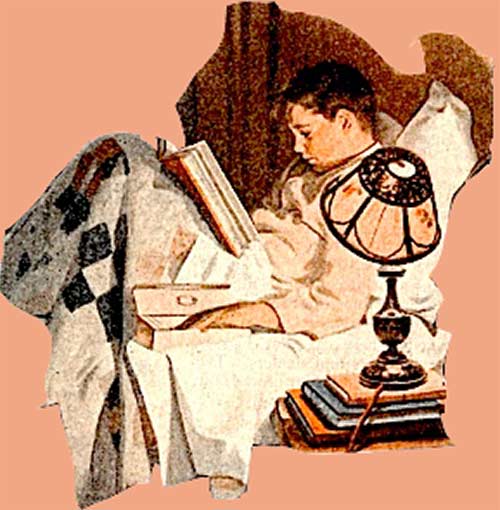I am not sure if I am genetically inclined to reading, or if I was simply raised to be a reader.
As far back as I can remember, Ma was always taking out books for me in the library. She knew the good authors from her many years of prowling the aisles. Then the grand transition from children's books (the eminent Fudge series by Judy Blume!) to young adult—Journey for a Princess, The Calico Captive, Mrs. Mike, Step to the Music.

Now I do my own selections, placing requests online; I prance into the library with anticipatory glee to collect a delicious stack from the wheezing librarian. P.G. Wodehouse, Lois McMaster Bujold (for which I owe Sparrow eternal gratitude), Norah Lofts (I have an homage to her scheduled), Frank Herbert, Nancy Mitford, Edna Ferber, and Bernard Cornwell are my current obsessions.
The house is adorned with baskets full of children's picture books, the den shelves are stocked with Gordon Korman. But not all children seem to be geared to read.
As my niece sits on my head on a Shabbos afternoon, I beg: "Just get a book."
She doesn't move.
"Go read something!" I eventually order. "We have books upon books upon books!"
She don't budge.
Frank Bruni shares my literate concern for the next generation in "Read, Kids, Read."
There’s research on this, and it’s cited in a recent article in The Guardian by Dan Hurley, who wrote that after “three years interviewing psychologists and neuroscientists around the world,” he’d concluded that “reading and intelligence have a relationship so close as to be symbiotic.”
In terms of smarts and success, is reading causative or merely correlated? Which comes first, “The Hardy Boys” or the hardy mind? That’s difficult to unravel, but several studies have suggested that people who read fiction, reveling in its analysis of character and motivation, are more adept at reading people, too: at sizing up the social whirl around them. They’re more empathetic. God knows we need that.
"God knows" is right.
One of the best recommendations from my mother was The Rich Are Different by Susan Howatch (there is a sequel, Sins of the Fathers. It took me four re-readings to realize it is a modern retelling of Julius Caesar and his heir, Octavion). What I adore about it is that the book is divided into segments, and the narration switches between the characters. When seeing the world through the many players' eyes, the stringencies of the black-and-white perspective blend together, forming inconclusive gray.

Are there villains, are there heroes? Who is the protagonist, who the antagonist? Is that character really so good? Is that person really so terrible? How do they consider the situation?
How do other people see me?
How do other people see me?
If we spend our last hours or minutes of the night reading rather than watching television, we wake the next morning with thoughts less jumbled, moods less jangled. Reading has bequeathed what meditation promises. It has smoothed and focused us.
"Blue light" stimulation prevents slumber; I cannot, and I mean cannot, fall asleep without reading first, whether one page fifty. It calms me, soothes me, and eases me onto a serene plane as I leave the anxieties of the day behind.

To read . . . perchance to dream . . .
As a life-long bookworm, this is good to hear.
ReplyDeleteI wonder if there is any research on how choice of genre affects a person - are romance readers more empathic than horror readers? Are science fiction and fantasy readers more imaginative than those of more realistic fiction? Or is it the actual process of reading that is key?
I also wonder if how 'difficult' a work is correlates to higher intelligence; was my long slog The Brothers Karamazov earlier this year better for me than if I'd skimmed Dan Brown? (I hope so!)
I hope so too! I loathe Dan Brown with a passion that his "work" became a best-seller . . . or do I hate all those people who consider themselves "readers"?
ReplyDeleteI don't have much imagination (besides worst-case scenarios); sci-di doesn't seem to be helping. I like to piggy-back on others imaginative brilliance.
But I think the empathy has to go with seeing a story unfold through another's eyes, and you aren't hearing only your own monologue.